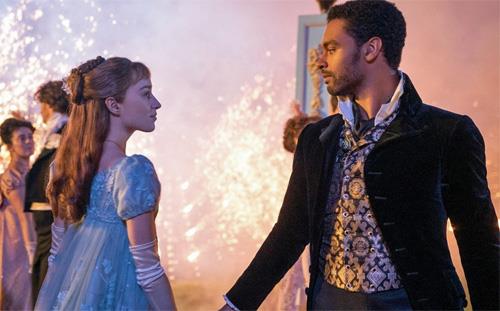
Frankly, many fans of British period romance have been a little concerned over the fact that Bridgerton, the new Regency era drama that debuts Christmas day on Netflix, is being produced by Shonda Rhimes.
That's not criticism of Rhimes so much as concern that this might not be a match.
Rhimes is noted for splashy, noisy, over-the-top productions where the characters speak in double-time and each plot twist is designed to be more outlandish than the one before.
The best British period dramas, of which there have been many, tend to unspool at a more deliberate pace, taking time to savor the verdant fields and marvel at the light pouring in through the drawing-room window. The characters almost always speak in polite, measured tones, no matter how aggravated they may feel, and while storylines advance, they don't do so with the kind of crazy leaps that became a Rhimes trademark in shows like Scandal or How To Get Away With Murder.
When Rhimes defected from ABC to Netflix, there was naturally some trepidation that without the restraints of broadcast network standards and practices, Rhimes might vault even higher over traditional bars.
That's why some British period drama fans have been thinking, "That's fine. Let her. But since we have so few shows to begin with, don't do it with ours. Find a contemporary drama and do it there."
So it's gratifying to report that with Bridgerton, the news is generally good.
The eight-episode drama, created by Chris Van Dusen from Julia Quinn novels and produced by Rhimes's Shondaland company, doesn't veer wildly away from the classic presentation of British period drama.
It has some wilder-than-usual touches, including a bizarre imaginary Queen Charlotte (Golda Rosheuvel), a few more four-letter words than we're accustomed to hearing in upper-class 19th century circles, and a few sex scenes that are more suggestive than explicit.
But the fundamental things still apply. The vistas are lovely, the interiors stunning, the costumes lavish, and the general tone and pace in keeping with the traditional model.
If it doesn't set a new standard for the genre, it honors enough of the right elements that in a time of relative famine, it's a satisfying meal.
While Bridgerton has the mandatory enormous cast, by the end of the first episode we have our featured couple: Daphne Bridgerton (Phoebe Dynevor, top) and Simon Basset (Rege-Jean Page, top).
It will come as no surprise to Regency drama fans that despite being the featured couple, Daphne and Simon flatly declare that they don't like each other, at least not in any romantic sense.
Their alliance stems from the fact that both are trying to avoid something.
The Bridgerton family has multiple daughters and in the custom of the day, the mother, Lady Violet Bridgerton (Ruth Gemmell), must be laser-focused on getting at least one of them, and eventually all of them, married to men of wealth, character, and standing.
The Bridgertons are well off, but not so well off that they can skip the daughter marriage step.
Daphne's brother, Anthony (Jonathan Bailey), with whom she has always been close and in whom she has often placed her trust, is on the case as well. He has arranged for her to be married to an associate of his, for reasons that are not entirely honorable.
Daphne loathes this man, for all the right reasons. Feigning an interest in Simon, she hopes, can derail her brother's plan.
Simon, who inherited the dukedom of Hastings from his revolting father, just wants to be left alone. But because he's a duke and he's handsome, every unmarried woman in Britain keeps trying to catch his eye.
If he can make it appear he is spoken for, perhaps he can get some peace and quiet. Or at least he can pursue only those relationships in which he's actually interested.
The Daphne and Simon drama is hardly the only one swirling around in this corner of entitled, mostly obnoxious, upper-class British society, but this one spawns a number of the others and gets most of the camera's attention.
It's also important to note that Bridgerton has a narrator of sorts: Lady Whistledown (voiced by Julie Andrews), who observes everything that is going on, seems to have sources everywhere, and always adds her own catty touches to her reports.
Thanks to Lady Whistledown, Bridgerton shares some DNA with Gossip Girl. But the commentator device doesn't overwhelm the story. More often it simply ties threads together.
Fans of Regency fiction will tell you the pleasure often lies more in the unfolding of the story than in deep suspense over where it will end up. Under Shonda Rhimes, Bridgerton seems willing to play it like that.